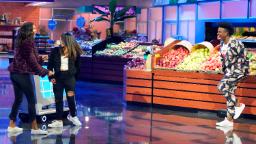
The phrase “global pandemic” had just been thrown around in the news the day before and even though I’d been prepping supplies and canned goods since the month prior, I decided that morning that our household could use a fresh round of the basics so we could hunker down for a couple of weeks. Everyone in West Los Angeles apparently had the same idea.
I’ll remember that morning for the rest of my life because walking into a crowded grocery store with mostly bare shelves was something I had been privileged enough to not have experienced before. Though, there had been a time when I wanted nothing more than to run through a grocery store, clearing shelves as I went along.
This store looked like it had fallen victim to lots of sweepers but not in a fun way. Carts were piled high but faces were masked and not smiling. The eyes that poked above face coverings were filled with worry.
By the time my turkey, ribs and I got to the checkout counter, and I heard that familiar beep, I didn’t think about “Supermarket Sweep.” I thought, “Get me the hell out of here.”
ABC will premiere its reboot of “Supermarket Sweep” on Sunday, hoping to feed viewers’ appetite for escapist programming with their new take on the game show once hosted by David Ruprecht. In the process, it will confront the question of whether it’s escapist at all to be reminded of our complicated relationship with grocery shopping and food this year, whether you couldn’t find toilet paper or are one of the millions struggling with food insecurity in wake of the economic downfall.
“We want it to be received with fun and laughter and joy and a little escape from the mask of it all,” executive producer Alycia Rossier told reporters on a recent conference call. “The grocery workers in the States have kept us alive for the last six months. They went to the store every day. And we see our store as a place of celebration.”
The show honors a grocery store worker in every episode and awards them $2,000, Rossiter said. The groceries featured in the show’s store were also all donated to the Los Angeles Food Bank or, in the case of perishables, donated to animal charities that could use them as feed.
“We were thinking about it every step of the way,” she said.
That includes host and executive producer Leslie Jones, who noted that while people aren’t wearing masks inside their fictional grocery store, they are essential items. (Contestants and those on set were tested for coronavirus prior to filming, which occurred in late July, and safety protocols were instituted on set.)
“I’m going to say right here, yeah, you’re supposed to have on your damn mask,” she said.
If you appreciate Jones and her brand of humor for being as inherently joyful as intended, you’ll enjoy her in the role of host.
Other than the prices of groceries, which will inspire sticker shock and the maximum amount of prize money ($100,000), no notable changes have been made to the game itself. And that’s great news because the game was perfect as it was.
Jones sees the hour-long show as a chance for people “to bond together and know that there’s still some good stuff going on and that there’s hope.”
Ultimately, viewers will decide if they’re ready to buy that.